A regional partnership of 10 countries in the Nile River basin region has announced the formal confirmation of an agreement on the equitable use of water resources, despite opposition from Egypt. The agreement, known as the “cooperative framework,” was ratified by Ethiopia, Uganda, Rwanda, Burundi, and Tanzania, with South Sudan joining most recently. However, Egypt and Sudan have declined to sign, while Congo abstained and Kenya has yet to deposit its ratification documents with the African Union. The Nile Basin Initiative described the accord as a testament to collective determination to harness the Nile River for the benefit of all and ensure its sustainable use for future generations.
The lack of ratification by Egypt and Sudan, who have expressed concern over potential reductions in their shares of Nile water, is likely to make the agreement controversial. Tensions have been rising in the region, largely due to Ethiopia’s construction of a $4 billion dam on the Blue Nile, a major tributary of the Nile River. Egypt is worried about the impact of the dam on its water and irrigation supplies downstream, while Ethiopia plans to use the dam to generate electricity. The rights clause of the accord states that Nile basin states must utilize water resources in an equitable and reasonable manner. The Nile is the longest river in the world, stretching over 6,695 kilometers, with two main tributaries originating in South Sudan and Ethiopia.
Amid the dispute with Ethiopia, Egypt has appeared to strengthen its position in the Horn of Africa by committing to security cooperation with Somalia, which opposes Ethiopia’s attempts to gain access to the sea through Somaliland. Under a recent agreement, Egypt could send peacekeeping troops to Somalia after the mandate of African Union peacekeepers expires in 2024. Egypt, a founding member of the Nile Basin Initiative, has historically asserted its rights to Nile water based on a colonial-era agreement with the UK from 1929. This agreement allocated specific water rights to downstream Egypt and Sudan, disregarding the other nations along the river basin seeking a more equitable distribution.
With the new accord in force, the remaining Nile basin states will need to navigate the complexities of regional water politics and find ways to work together to ensure fair and sustainable use of the Nile’s resources. The agreement represents a significant step towards cooperation and collective management of the river, despite the challenges posed by the opposition of key countries like Egypt and Sudan. The coming years will likely see continued negotiations and discussions among the Nile riparian countries to address issues of water rights and usage, especially in the context of growing populations and increasing demands on Nile water resources.
The Nile Basin Initiative praised the governments and people of the region for their dedication to reaching a mutually beneficial agreement on the utilization of Nile water. As the region grapples with climate change impacts and a growing need for water resources, cooperation among Nile basin states will be crucial for ensuring sustainable development and peaceful relations. The full implementation of the accord will require ongoing commitment from all parties involved, as well as a willingness to address differences and find common ground in the management of this vital transboundary river.


